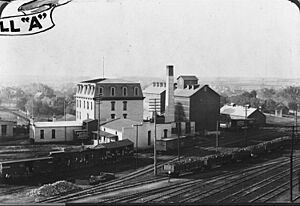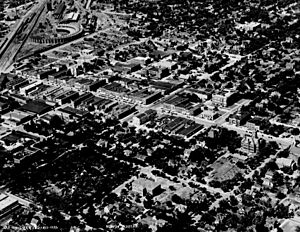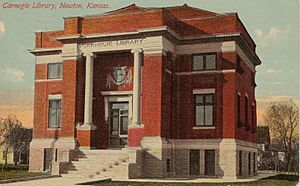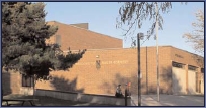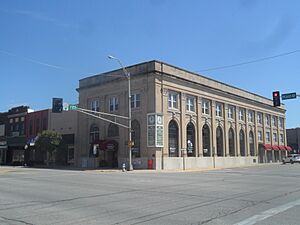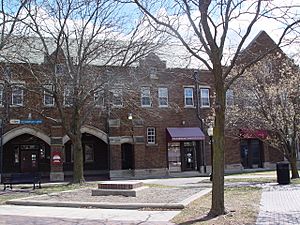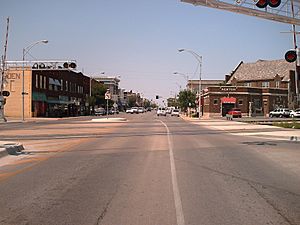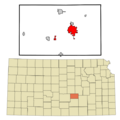Newton, Kansas facts for kids
Quick facts for kids
Newton, Kansas
|
||
|---|---|---|
|
City and County seat
|
||
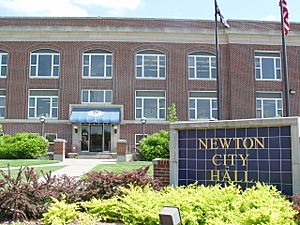
Newton City Hall at 201 E 6th St (2006)
|
||
|
||
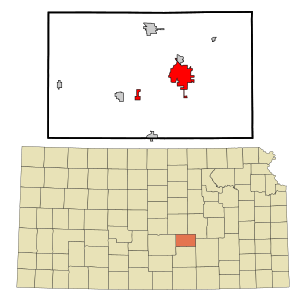
Location within Harvey County and Kansas
|
||
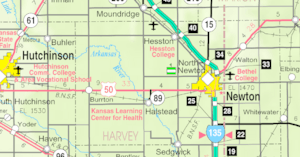
|
||
| Country | United States | |
| State | Kansas | |
| County | Harvey | |
| Township | Newton | |
| Founded | 1871 | |
| Incorporated | 1872, 1880 | |
| Named for | Newton, Massachusetts | |
| Area | ||
| • Total | 14.57 sq mi (37.73 km2) | |
| • Land | 14.57 sq mi (37.73 km2) | |
| • Water | 0.00 sq mi (0.00 km2) | |
| Elevation | 1,434 ft (437 m) | |
| Population
(2020)
|
||
| • Total | 18,602 | |
| • Density | 1,276.7/sq mi (493.03/km2) | |
| Time zone | UTC-6 (CST) | |
| • Summer (DST) | UTC-5 (CDT) | |
| ZIP code |
67114
|
|
| Area code | 316 | |
| FIPS code | 20-50475 | |
| GNIS ID | 485629 | |
Newton is a city in Kansas, and it's the main town of Harvey County. In 2020, about 18,602 people lived there. Newton is about 25 miles (40 km) north of Wichita. Just north of Newton is another town called North Newton, which is a separate place. Newton is easy to get to because major highways like Interstate 135, U.S. Route 50, and U.S. Route 81 all meet there.
Contents
Newton's Story: A Look Back
How Newton Began: The 1800s
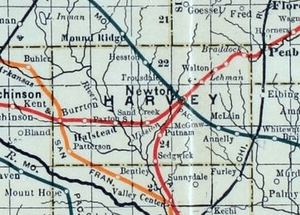
For thousands of years, Native American tribes lived on the land where Kansas is now. In 1803, the United States bought this land as part of the Louisiana Purchase. Kansas became a U.S. territory in 1854 and then the 34th state in 1861. Harvey County, where Newton is, was created in 1872.
The city of Newton was founded in 1871. It was named after Newton, Massachusetts, because some of the railway owners were from there.
In 1871, the Atchison, Topeka and Santa Fe Railway built its main line to Newton. This made Newton an important place for shipping cattle from Texas.
In August 1871, there was a famous event called the Gunfight at Hide Park. Eight men were killed in this incident. Because of this, Newton became known as a "wicked" and "lawless" city in the Old West.
In 1872, Newton became the end of the line for the Atchison, Topeka and Santa Fe Railway. It was also the railhead for the Chisholm Trail, a famous route for moving cattle. After the city was officially formed in 1872, the city council even passed a rule to stop buffalo and other wild animals from roaming freely!
Newton in the 1900s
During World War II, the Newton airport was used by the US Navy. Its main runway was made much longer, over 7,000 feet (2,134 m).
Newton was once a major control center for the "Santa Fe" railway's Middle Division. This changed in the mid-1980s when all train control for the railway system was moved to Chicago. In 1995, the Santa Fe railway joined with the Burlington Northern Railroad to become the BNSF Railway. The BNSF Railway is still a big business in Newton, even though it employs fewer people now.
Newton in the 2000s
On February 25, 2016, Newton was connected to a series of shooting incidents. These events ended with a tragic shooting at a factory in nearby Hesston.
Newton's Location and Weather
Where is Newton?
According to the United States Census Bureau, the city covers about 12.60 square miles (32.63 km2) of land. There is no water area within the city limits.
Newton is located in the middle of the United States. U.S. Highway 81, also called the Meridian Highway, runs through Newton. This highway stretches all the way from Canada to Mexico. U.S. Highway 50 also passes through Newton. This highway goes from Washington, D.C., all the way to California.
Newton's Climate
The weather in Newton has hot, humid summers. Winters are usually mild to cool. Newton has a humid subtropical climate. This means it gets plenty of rain and has warm temperatures for much of the year.
| Climate data for Newton, Kansas, 1991–2020 normals, extremes 1897–present | |||||||||||||
|---|---|---|---|---|---|---|---|---|---|---|---|---|---|
| Month | Jan | Feb | Mar | Apr | May | Jun | Jul | Aug | Sep | Oct | Nov | Dec | Year |
| Record high °F (°C) | 75 (24) |
85 (29) |
93 (34) |
97 (36) |
103 (39) |
112 (44) |
117 (47) |
115 (46) |
108 (42) |
98 (37) |
88 (31) |
81 (27) |
117 (47) |
| Mean maximum °F (°C) | 64.5 (18.1) |
70.0 (21.1) |
78.9 (26.1) |
85.2 (29.6) |
92.3 (33.5) |
97.9 (36.6) |
103.2 (39.6) |
101.8 (38.8) |
96.9 (36.1) |
88.7 (31.5) |
74.9 (23.8) |
64.3 (17.9) |
104.4 (40.2) |
| Mean daily maximum °F (°C) | 41.7 (5.4) |
46.6 (8.1) |
57.3 (14.1) |
66.9 (19.4) |
76.3 (24.6) |
87.0 (30.6) |
92.0 (33.3) |
90.3 (32.4) |
82.5 (28.1) |
69.7 (20.9) |
55.7 (13.2) |
43.9 (6.6) |
67.5 (19.7) |
| Daily mean °F (°C) | 31.0 (−0.6) |
35.2 (1.8) |
45.2 (7.3) |
54.9 (12.7) |
65.5 (18.6) |
76.0 (24.4) |
80.9 (27.2) |
79.0 (26.1) |
70.7 (21.5) |
57.7 (14.3) |
44.4 (6.9) |
33.9 (1.1) |
56.2 (13.4) |
| Mean daily minimum °F (°C) | 20.3 (−6.5) |
23.8 (−4.6) |
33.1 (0.6) |
42.9 (6.1) |
54.7 (12.6) |
65.0 (18.3) |
69.8 (21.0) |
67.6 (19.8) |
59.0 (15.0) |
45.7 (7.6) |
33.2 (0.7) |
23.9 (−4.5) |
44.9 (7.2) |
| Mean minimum °F (°C) | 2.8 (−16.2) |
6.3 (−14.3) |
15.1 (−9.4) |
26.7 (−2.9) |
39.4 (4.1) |
52.3 (11.3) |
59.3 (15.2) |
56.8 (13.8) |
43.0 (6.1) |
28.6 (−1.9) |
16.2 (−8.8) |
7.0 (−13.9) |
−1.5 (−18.6) |
| Record low °F (°C) | −20 (−29) |
−28 (−33) |
−7 (−22) |
10 (−12) |
23 (−5) |
40 (4) |
43 (6) |
43 (6) |
29 (−2) |
10 (−12) |
−4 (−20) |
−20 (−29) |
−28 (−33) |
| Average precipitation inches (mm) | 0.80 (20) |
1.25 (32) |
2.38 (60) |
2.92 (74) |
4.89 (124) |
5.01 (127) |
4.20 (107) |
3.89 (99) |
2.98 (76) |
2.64 (67) |
1.65 (42) |
1.16 (29) |
33.77 (857) |
| Average snowfall inches (cm) | 2.1 (5.3) |
1.3 (3.3) |
1.2 (3.0) |
0.3 (0.76) |
0.0 (0.0) |
0.0 (0.0) |
0.0 (0.0) |
0.0 (0.0) |
0.0 (0.0) |
0.1 (0.25) |
0.6 (1.5) |
3.2 (8.1) |
8.8 (22.21) |
| Average precipitation days (≥ 0.01 in) | 4.2 | 4.8 | 7.1 | 7.7 | 9.7 | 8.5 | 8.3 | 7.8 | 6.4 | 6.6 | 4.9 | 5.0 | 81.0 |
| Average snowy days (≥ 0.1 in) | 1.6 | 1.4 | 0.6 | 0.2 | 0.0 | 0.0 | 0.0 | 0.0 | 0.0 | 0.1 | 0.4 | 1.5 | 5.8 |
| Source 1: NOAA | |||||||||||||
| Source 2: National Weather Service | |||||||||||||
People of Newton: Demographics
| Historical population | |||
|---|---|---|---|
| Census | Pop. | %± | |
| 1880 | 2,601 | — | |
| 1890 | 5,605 | 115.5% | |
| 1900 | 6,208 | 10.8% | |
| 1910 | 7,862 | 26.6% | |
| 1920 | 9,781 | 24.4% | |
| 1930 | 11,034 | 12.8% | |
| 1940 | 11,048 | 0.1% | |
| 1950 | 11,590 | 4.9% | |
| 1960 | 14,877 | 28.4% | |
| 1970 | 15,439 | 3.8% | |
| 1980 | 16,332 | 5.8% | |
| 1990 | 16,700 | 2.3% | |
| 2000 | 17,190 | 2.9% | |
| 2010 | 19,132 | 11.3% | |
| 2020 | 18,602 | −2.8% | |
| U.S. Decennial Census 2010-2020 |
|||
Newton is part of the larger Wichita metropolitan area. Harvey County, where Newton is located, has about 34,361 people. It's known for farming and small factories. The Wichita metro area, which includes Harvey County, has about 650,000 people. Wichita is the biggest city in this area, located about 20 miles (32 km) south of Newton.
Newton's Population in 2020
The 2020 United States census counted 18,602 people living in Newton. There were 7,501 households and 4,798 families. The population density was about 1,276 people per square mile (493/km2).
Most people in Newton (about 78.79%) were white. About 2.53% were black, and 1.01% were Native American. About 17.77% of the population identified as Hispanic or Latino.
About 29.4% of households had children under 18. The average household had 2.4 people, and the average family had 3.0 people. About 21.5% of people had a college degree or higher.
About 24.1% of the population was under 18 years old. The average age in Newton was 39.2 years.
Fun Places to Visit in Newton
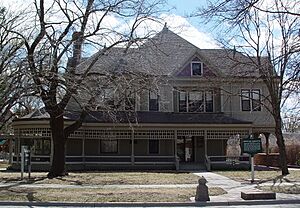
Newton has many interesting places to explore:
- Harvey County Historical Society Library and Museum: Learn about the area's past.
- Kauffman Museum: Discover local history and culture.
- Warkentin House: Visit a beautiful Victorian house that is now a museum.
- Mennonite Settler statue: See a statue honoring early settlers.
- Blue Sky Sculpture: Enjoy this unique piece of art.
- Sand Creek Trail: A great place for a walk or bike ride.
- Carriage Factory Art Gallery: See local art.
- Sand Creek Station Golf Course: Play a round of golf on this highly-rated course.
Learning in Newton: Schools and Colleges
Schools for Kids
The public schools in Newton are part of the Newton USD 373 school district.
- High School
- Newton High School
- Middle Schools
- Santa Fe 5/6 Center
- Chisholm Middle School
- Elementary Schools
- Northridge Elementary
- Slate Creek Elementary
- South Breeze Elementary
- Sunset Elementary
- Early Education
- Cooper Early Education
- Private Schools
Newton also has two private schools for students from kindergarten to 8th grade:
- St. Mary's Catholic School
- Newton Bible Christian School
Colleges Near Newton
- Bethel College is located very close by in North Newton.
- Hutchinson Community College has a campus in Newton at the Axtell Education Center.
Newton's Media: News and Entertainment
Newspapers
The Newton Kansan is the local newspaper for Newton and the surrounding area. It comes out daily except on Sundays and Mondays. The Wichita Eagle is the main newspaper for the whole region. There's also Harvey County Now, a newspaper based in Newton that covers news for all of Harvey County.
Radio Stations
- AM Radio
- KJRG-AM 950 kHz: Plays Christian talk shows.
- FM Radio
- KKGQ-FM 92.3 MHz: Known as ESPN Wichita 92.3, it plays sports programs.
- KBCU-FM 88.1 MHz: This station is from Bethel College (Kansas) and plays college event news and Jazz music.
Television
Newton can receive over-the-air ATSC digital TV channels from the Wichita-Hutchinson area. You can also get cable TV from Cox Communications or satellite TV.
Getting Around Newton: Transportation
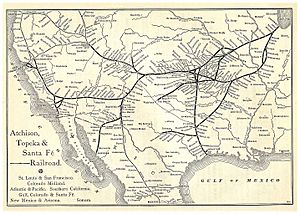
The BNSF Railway runs through Newton, helping with transportation and shipping goods. Amtrak's Southwest Chief train stops in Newton twice a day. This train offers passenger service to places like Los Angeles and Chicago. The Amtrak station is located at 414 N Main St.
Bus service is available daily to Wichita and Salina through BeeLine Express. While Newton doesn't have a regular city bus system, Harvey Interurban offers a dial-a-ride service for the community.
Major roads that go through Newton include I-135, US-50, US-81, and K-15.
The Newton City/County Airport (FAA: EWK) is located 2 miles (3.2 km) east of Newton. Its runway is over 7,000 feet (2,134 m) long, making it one of the longest in Kansas. It also has modern landing systems to help planes land safely.
Famous People from Newton
- See also List of people from Harvey County, Kansas
Many notable people have connections to Newton, including:
- Tom Adair (1913–1988), a talented screenwriter, musician, and composer.
- Donna Atwood (1925–2010), a famous figure skater and star of the Ice Capades.
- Errett Bishop (1928–1983), a well-known mathematician and college professor.
- Tony Clark (born 1972), a former MLB player and now a union executive.
- Rita Crocker Clements (1931-2018), a Republican Party organizer and First Lady of Texas.
- Reed Crandall (1917-1982), a famous illustrator of comic books and magazines.
- James Earp (1841-1926), brother of the famous lawmen Wyatt Earp and Virgil Earp.
- Harold Foster (1906–1996), a successful basketball coach and Hall of Fame member.
- Orville Harrold, a talented opera singer.
- Elizabeth Hoisington (1918–2007), a high-ranking officer in the United States Army.
- John Houston (1890–1975), a politician and former Mayor of Newton.
- John Janzen (born 1937), a professor and author.
- Miles Johns (1994-), a mixed martial artist who competes in the UFC.
- Samuel Peters (1842–1910), a Union Army Captain, judge, and U.S. Representative.
- Dustin Richardson (born 1984), a former MLB pitcher.
- Jacob Schowalter (1879–1953), a generous giver and former Kansas State Representative.
- Jesse Unruh (1922–1987), an important politician from California.
- Mike Wellman (born 1956), a former NFL player.
- Dallas Wiebe (1930-2009), a writer.
- John Yoder (1951–2017), a judge and state senator in West Virginia.
Images for kids
See also
 In Spanish: Newton (Kansas) para niños
In Spanish: Newton (Kansas) para niños
 | Kyle Baker |
 | Joseph Yoakum |
 | Laura Wheeler Waring |
 | Henry Ossawa Tanner |



